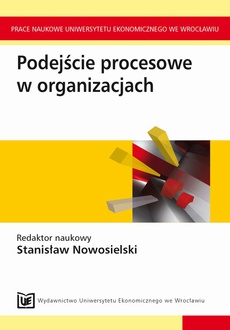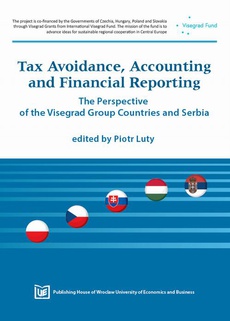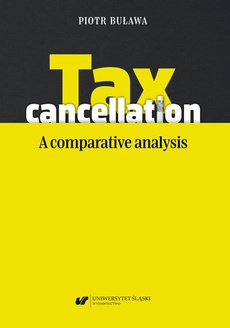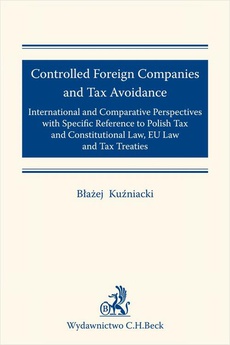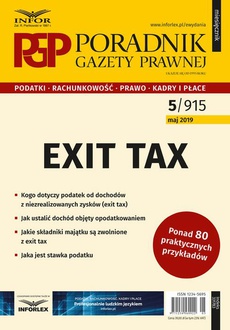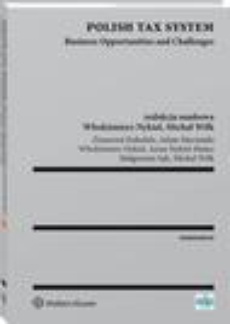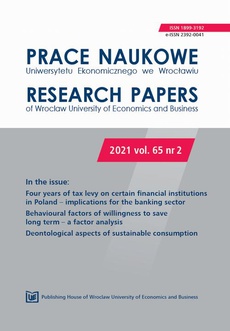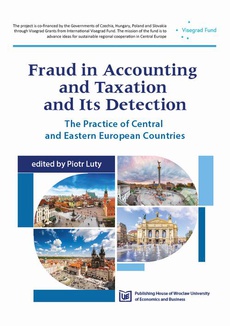POLECAMY
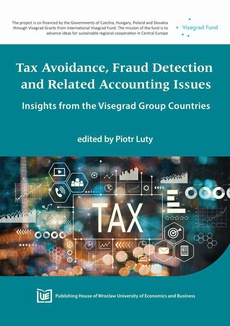
Tax Avoidance, Fraud Detection and Related Accounting Issues
Insights from the Visegrad Group Countries
Redakcja:
Format:
ibuk
Książka powstała przy współudziale naukowców z Polski oraz Czech, w tym także młodych naukowców ze Szkoły Doktorskiej UEW. Omówione w monografii zagadnienia dotyczą teoretycznych aspektów unikania opodatkowania i roli rachunkowości w wykrywaniu oszustw finansowych. Szczególnym jej walorem są rozdziały o charakterze aplikacyjnym, opisujące wykrywanie manipulacji w sektorze najmu oraz ukazujące wpływ zmian systemu prawa podatkowego na występowanie anomalii w kształtowaniu podatku od zysków kapitałowych.
| Rok wydania | 2022 |
|---|---|
| Liczba stron | 116 |
| Kategoria | Publikacje darmowe |
| Wydawca | Wydawnictwo Uniwersytetu Ekonomicznego we Wrocławiu |
| ISBN-13 | 978-83-7695-970-2 |
| Numer wydania | 1 |
| Język publikacji | polski |
| Informacja o sprzedawcy | ePWN sp. z o.o. |
Ciekawe propozycje
Spis treści
| Introduction (Piotr Luty) | 9 |
| 1. The motives for tax avoidance (Dominika Florek) | 13 |
| 1.1. Introduction | 13 |
| 1.2. Classification of tax avoidance motives | 13 |
| 1.3. Principal psychological factors influencing tax avoidance | 18 |
| 1.4. Conclusions | 25 |
| References | 26 |
| 2. Types of tax burden reduction, types of tax burden optimisation and its results – a literature review (Anna Fuks, Patrycja Świerczek-Dutka) | 29 |
| 2.1. Introduction | 29 |
| 2.2. Tax burden optimisation in international publications from SCOPUS | 30 |
| 2.3. Tax burden optimisation under Polish tax law in Polish publications | 34 |
| 2.4. Conclusions | 38 |
| References | 39 |
| 3. Accounting for corporate income tax and identifying manipulation in Visegrad Group countries (Hana Bohušova) | 41 |
| 3.1. Introduction | 41 |
| 3.2. The relation between financial reporting and corporate income tax | 42 |
| 3.3. Accounting systems in the Visegrad Group countries | 43 |
| 3.4. Methods of identifying the manipulation of financial statements in the Visegrad Group countries | 45 |
| 3.5. Conclusions | 49 |
| References | 49 |
| 4. A review of the adopted business model of tax solutions influencing the private equity and venture capital activity in selected countries (Ilona Fałat-Kilijańska) | 54 |
| 4.1. Introduction | 54 |
| 4.2. The definition and role of private equity funds | 55 |
| 4.3. General rules for private equity and venture capital fund taxation | 62 |
| 4.4. Legal forms of private equity and venture capital business and tax regimes in the Visegrad Group member states | 64 |
| 4.5. European ideas for the strengthening of private equity and venture capital activity | 73 |
| 4.6. Conclusions | 80 |
| 4.7 Conclusions | 83 |
| References | 84 |
| 5. Tax fraud detection in accommodation services (Pavel Semerád, Lucie Semerádová, Michal Radvan) | 87 |
| 5.1. Introduction | 87 |
| 5.2. The background of tax frauds in Czech Republic in COVID times | 89 |
| 5.3. The model examples of entrepreneurs | 90 |
| 5.4. Conclusions | 95 |
| References | 96 |
| 6. Using Benford’s law to detect anomalies in the taxpayers’ behaviour on the example of Polish income taxes (Piotr Luty) | 99 |
| 6.1. Introduction | 99 |
| 6.2. Literature review and hypothesis development on Benford’s law application | 100 |
| 6.3. Research method and sample | 103 |
| 6.4. The research results. Distributions conformity in 2018-2020 | 107 |
| 6.5. Conclusions | 111 |
| References | 112 |
| Summary | 114 |










